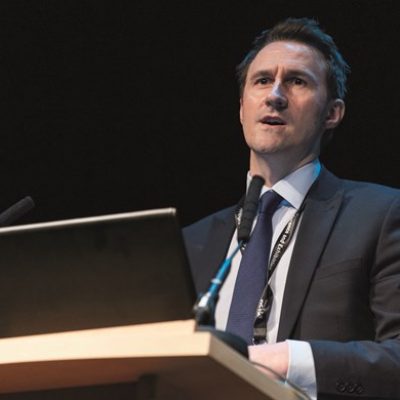Keith Smith has a unique perspective on the FE sector’s challenges, having viewed them at bird’s eye level as one of the Department for Education’s top policy masterminds, and now on the campus frontline as chief executive of Harrow, Richmond & Uxbridge Colleges (HRUC).
Smith’s fingerprints are all over many of the policies that have shaped the FE sector as we know it. At the Education and Skills Funding Agency, he led on apprenticeship funding reforms and the introduction of the levy, before becoming the architect of the 2021 skills white paper as DfE’s director of strategy.
After receiving a college education, Smith skilled himself up further during his 25-year civil service career by taking short courses at night school. He later helped come up with the government’s lifelong learning entitlement (LLE) policy, which aims to ease the way for others to bypass the traditional degree route to success too.
Nowadays, Smith sees himself as “living the skills white paper” he helped design. The strategic vision he’s drawn up for HRUC is the embodiment of it.
He sees the purpose of his colleges as being to drive local economic prosperity and social mobility, which he is aspiring to do by consolidating links with local employers, embarking on new relationships with schools, and expanding apprenticeships provision.
While Smith is no longer a civil servant, he is still unflinchingly loyal to his old bosses and is clearly wary of being drawn into any criticism of them. His deeply engrained Whitehall mindset and his wish not to discuss his life outside of his current role makes him a tough, but fascinating, interviewee.

The college route
Smith does not fit the stereotype of a senior civil servant in that he did not go to university, never mind the traditional Oxbridge route.
A 2019 report by the Sutton Trust found that 100 per cent of permanent secretaries across government had attended university, reflecting how rare Smith’s education journey was for a senior civil servant.
Smith is from and still lives in the Midlands, these days commuting from there to the three colleges he oversees across five London campuses. He studied business and finance at a college and skilled himself up later in life through night school “lifelong learning” courses.
“I only started to do university-type training later on in my career as professional development,” he said.
He went on to propose through the skills white paper a Lifelong Loan Entitlement, enabling any adult to access loans for higher technical courses as they would for a university degree.
Ministers pin their hopes of reversing the decimation of adult education on the LLE, and you can to a point see Smith’s own education journey in the policy’s design.
“I talk about the progressive nature of education and skills creating a future for everyone, because I was a product of that myself,” he says.
“My hope is that if we do our job well now, there’ll be more people in boardrooms who haven’t been to university and have acquired skills in many different routes.”

Civil service ladder
Smith’s career began with eight years at an employment benefit office. Seeing people “at their most vulnerable, when they’ve just been made redundant”, made a deep impression on him.
“It’s a really terrible thing to go through, and you see how much people need support. That duty to help stayed with me.”
He then worked for what is now the Department for Work and Pensions (then called the Employment Service), before moving onto the Department for Business, Innovation & Skills, working mainly for non-departmental public bodies (NDPBs) on the “operational side of policy”.
He has “always loved being at the frontline where policy touches delivery,” and continued doing that when he moved to the Education and Skills Funding Agency. He worked his way up to director of funding and programmes and later director of apprenticeships, and was heavily involved in the rollout of the apprenticeship levy in 2017.
He points out how for a decade before that, the “big policy” of government had been “getting more young people to go to university”.
Therefore, his “overwhelming feeling” at the time was, “isn’t it wonderful that we’re now putting apprentices back on the map”.
He sees this period as the “start of the renaissance of apprenticeships”, which Smith believes are part of the skills systems of all the “really innovative” countries.
His aim now at HRUC is to be able to “offer an apprenticeship to anybody that wants one”.
But Smith is not blind to the challenges facing the apprenticeships market. Last year, he endorsed a report from Policy Exchange claiming that the levy system suffers from both a “lack of transparency and poor understanding about its purposes”.
Smith admits, when asked about criticism of the levy, that “systems always have to improve”.

White paper architect
When Smith became DfE’s director of strategy in 2020, it was the first time he had been focused solely on policy rather than “running a major programme” and “actually delivering things”.
Some of the policies in the Skills for Jobs white paper that he drafted have since been enacted – local skills employment plans, for example, which aim to align college and training provider courses to local skills needs, are now being turned into actionable goals.
Ministers insist the LLE is on track to be introduced from 2025, even though in a recent higher education short course trial of the entitlement, only 125 students from an expected 2,400 enrolled onto the courses.
“Who knows what” the upcoming general election will bring, Smith says. “You just hope enough of that [policy work] sticks for long enough that we will see really meaningful change.”
After finishing the white paper, Smith felt it would “not be easy” to “keep being in that space” at DfE. “How do you match that?” he questions.
But his decision to leave in 2022 was not easy, given that his entire career had been in the civil service. Smith reflects on his time there, he says, without regrets. He feels “very lucky” to have worked on “big system issues”. But he also admits that he “never felt fully complete in doing that”.
“I loved that job, and I’d be doing it today … except that I wanted to take all of the things I thought we could do as a system and do it within an organisation.
“There’s no better way in my mind of doing that than with a college.”
These days, he misses the “really fantastic people” he worked with in government. He has “huge respect” for ministers, “because they’ve got constituency jobs too and many of them are parents”.
“When you work really closely with them, you see just how committed they have to be just to even turn up every day, let alone deal with all of the weight of the problems they have to deal with. You see their human side, whereas many people just see the person on TV or the letter that they’ve sent.”
As a civil servant Smith could, to some extent, hide behind the ministers fronting policy decisions. As a college leader though, he sees his role as “time to be held accountable personally for doing things within an organisation”.

Merger beginnings
Smith joined the then HCUC (Harrow College and Uxbridge College) at a turbulent time. A merger with Richmond-upon-Thames College (RuTC) was looming after the college had been put at “significant risk” by financial management failures two years previously.
RuTC already had plans in motion to rationalise its college estate, with some college buildings being bulldozed to make way for new homes.
Meanwhile, HCUC was leading the West London Institute of Technology, one of 12 IoTs rolled out nationwide.
As part of the merger plans, it was decided that the West London Institute of Technology would expand into a new £10 million STEM facility as part of RuTC’s estate redevelopment, which is set for completion this summer.
The merger was finally sealed in January 2023 after a 17-month delay due to “ongoing risks” around the Richmond redevelopment, a finance report said.
The merger involved a “huge amount of work” from Smith, but he is proud of having gone through it without making anyone redundant as a result.
“If anything, we want to grow what we do between the colleges.”
Although he admits that “financial constraints” were a consideration, Smith does not see the merger as having been driven by finance. He believes that viewing it “through the lens of money” would mean that “things would fail over time”.
“You’ve got to have a clear purpose for why you want to be coming together. Ours was all about how we enhance the offer in Richmond and play to the strengths we have in Harrow and Uxbridge.”

Sixth form provision
Smith believes his Whitehall experience has made him more “visionary” and prepared to “take risks” as a college leader. “No relationship is too big” to consider.
This helps explain why he is currently linking West London IoT with The Massachusetts Institute of Technology, through an industry liaison programme. He is hoping the partnership will enable his staff to learn from the American experts what makes for a successful IoT.
Another initiative Smith is excited about is a unique “sixth form plus” offer that RuTC is partnering with its local Richmond upon Thames School on, at its redeveloped RuTC campus.
The partnership, which will provide a hybrid teaching model of A-level and vocational courses, will be operate under a co-ownership model overseen by an executive management board.
Smith sees the provision as bringing “the best of schools and colleges together through collaboration”.
He is concerned that the “big system challenge that policymakers in the future have” is the “challenge of competition”, with colleges, school sixth forms and sixth form colleges “for too long being often pitted against each other”.
Smith sees opportunities on the horizon if the advanced British standard (ABS) qualification goes ahead as planned – as long as educators can “collaborate differently”.

‘Messages do get heard’ by DfE
He welcomes that the ABS qualification would spell “more contact hours” for college students, but concedes that the sector is already facing “constraints” in the contact time it can currently offer.
As a college CEO, his biggest challenge is teacher recruitment, and although he knows “there’s no single easy fix”, it is still “important that we tell our DfE colleagues that this is a real problem for us”.
He urges the college sector “not always to get frustrated when it feels like we’re not being listened to [by DfE], because there are fiscal, political and practical constraints” in the echelons of power that “we are not part of.”
“One thing I know for sure, having done the job for a long time is that the messages do get heard. It doesn’t always feel like that. But we should never give up trying to improve and advocating, because it matters so much.”









Your thoughts